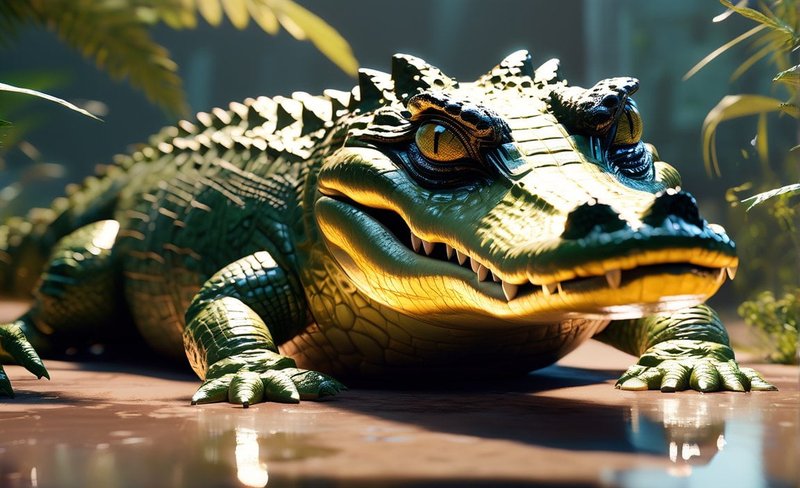
Their cognitive skills are critical for survival, aiding them in hunting, navigating their environments, and even social interactions. So, how smart is a crocodile, really? Let’s dive into the world of these fascinating reptiles and explore their mental prowess and behaviors that might just change how you see them.
Crocodiles: More Than Just Teeth and Scales
Crocodiles have been roaming the Earth for over 200 million years, and their intelligence is often underrated. These reptiles are equipped with a brain that’s surprisingly adaptable for a creature of their size. Their brains are not the largest in the animal kingdom, but they are highly efficient. Research shows that the brain structure of crocodiles is similar to birds, which suggests they possess complex cognitive abilities.
You might be wondering, what does this mean for their behavior? Well, for starters, crocodiles can learn from their experiences. This learning capacity helps them adapt their hunting strategies depending on the environment and the prey. For instance, if they encounter a certain type of fish regularly, they might start to develop specific tactics to catch it better. This kind of learning is a sign of intelligence, as it shows they can make decisions based on past experiences.
Hunting Strategies and Problem-Solving
Crocodiles are skilled hunters, using a mix of stealth and strategy. Have you ever seen one lie perfectly still, camouflaged among reeds and mud? This is no accident; they’re waiting for the right moment to strike. Their ability to plan and execute a successful ambush is a testament to their cognitive skills.
Moreover, they’ve been observed using tools in the wild, which is a behavior linked to higher intelligence. For example, some crocodiles have been seen balancing sticks on their snouts to lure birds. This kind of tool use is rare in the animal kingdom and shows that they can reckon with their environment in a clever way. Isn’t it fascinating to think of how they manipulate their surroundings to benefit themselves?
Social Behavior: Communicating and Bonding
Crocodiles might seem solitary, but social interactions play a vital role in their lives. They communicate in various ways, from vocalizations to body language. For example, they produce specific sounds to express distress or to call out to their young. If you’ve ever heard a juvenile croc squeak, it’s actually a way for them to signal for help or attract attention from their mother.
Speaking of mothers, crocodilians display a surprising level of maternal care. Some species guard their nests fiercely and even help their hatchlings reach the water after they’ve hatched. This caring instinct indicates a level of social intelligence, as they can recognize their young and respond to their needs.
Understanding Their Environment
Crocodiles are adept at navigating their habitats. They utilize both their acute vision and keen sense of smell to understand their surroundings. You might find it interesting that they can hunt effectively in murky waters where visibility is low. Their brains help them interpret sensory information, which is crucial for survival.
A study conducted on captive crocodiles revealed that they could memorize the layout of their enclosures, showcasing their spatial awareness. This ability to remember locations and understand their environment is a sign of cognitive sophistication that adds depth to how we see these reptiles.
Learning and Memory
Like many animals, crocodiles possess impressive memory capabilities. They can learn from their experiences and retain that knowledge over time. Imagine a croc that encounters a trap while hunting. If it successfully evades it, it’ll remember that spot, allowing it to navigate around it in the future.
Their memory isn’t just limited to hunting scenarios; it extends to social interactions, too. For instance, younger crocs that have interacted with larger or more dominant individuals tend to behave differently in the future, exhibiting caution in their presence. This kind of adaptive behavior is vital for long-term survival in the wild.
Obstacles and Challenges
However, crocodiles are not immune to challenges. Sometimes their memory can lead to problems. If they’re consistently fed by humans in a specific location, they might end up associating that place with food. This can lead to conflicts with people, as they may wander into areas where they shouldn’t. Understanding these behaviors can help us coexist more peacefully with these remarkable reptiles.
Crocodiles and Their Environment
The relationship between crocodiles and their ecosystems is complex. Their intelligence plays a role in how they interact with other species and maintain their habitats. For example, by preying on various fish species, they help maintain the balance in aquatic environments. This ecological role showcases their importance beyond just being fearsome predators.
You might be surprised to learn that in some areas, crocodiles can even influence the populations of herbivores by their hunting practices. This, in turn, affects the vegetation and overall health of the ecosystem. So, thinking about crocodile intelligence also means thinking about the role they play in their habitats.
Conservation and Awareness
Understanding how smart crocodiles are can help us appreciate them more and spark interest in their conservation. Sadly, these incredible creatures face numerous threats, including habitat loss and poaching. When we share knowledge about their cognitive abilities, it can shift perceptions and promote a greater appreciation for their role in the ecosystem.
By valuing their intelligence and understanding their behaviors, we can create more effective conservation strategies. It’s essential to raise awareness about their significance, so future generations can continue to learn about these fascinating reptiles.
So, how smart is a crocodile? It turns out they are pretty savvy! Their ability to learn, adapt, and communicate challenges the perception of reptiles as simply instinct-driven hunters. They exhibit complex behaviors that hint at a rich inner life, showcasing intelligence that is both surprising and impressive.
As we delve deeper into the world of crocodiles, it’s essential to remember their role in our ecosystems and the importance of preserving their habitats. The more we understand them, the better we can appreciate these incredible reptiles. Next time you think of crocodiles, remember they’re not just fierce hunters; they’re brilliant survivors with a lot to teach us about intelligence in the animal kingdom.

